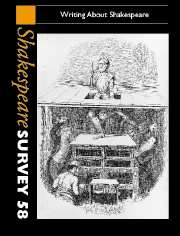Book contents
- Frontmatter
- Having Our Will: Imagination in Recent Shakespeare Biographies
- Toward a New Biography of Shakespeare
- Jonson, Shakespeare and the Exorcists
- ‘Lending soft audience to my sweet design’: Shifting Roles and Shifting Readings of Shakespeare’s ‘A Lover’s Complaint’
- ‘Armed at point exactly’: The Ghost in Hamlet
- Writing About Motive: Isabella, the Duke and Moral Authority
- Writing Performance: How to Elegize Elizabethan Actors
- Elizabeth Montagu: ‘Shakespear’s poor little Critick’?
- Rewriting Lear’s Untender Daughter: Fanny Price as a Regency Cordelia in Jane Austen’s Mansfield Park
- The Prequel as Palinode: Mary Cowden Clarke’s Girlhood of Shakespeare’s Heroines
- Shakespeare Among the Workers
- Virginia Woolf Reads Shakespeare: Or, her Silence on Master William
- Shakespeare and the Invention of the Epic Theatre: Working with Brecht
- Dramatizing the Dramatist
- Shakespeare in Drama Since 1990: Vanishing Act
- Writing about [Shakespearian] performance
- Shakespeare and the Prospect of Presentism
- Writing Shakespeare in the Global Economy
- The ‘Complexion’ of Twelfth Night
- Translation as Appropriation: Vassilis Rotas, Shakespeare and Modern Greek
- How Old Were Shakespeare’s Boy Actors?
- Mistress Tale Porter and the Triumph of Time: Slander and Old Wives’ Tales in The Winter’s Tale
- Shakespeare Performances in Ireland, 2002–2004
- Shakespeare Performances in England, 2004
- Professional Shakespeare Productions in the British Isles January–December 2003
- The Year's Contributions to Shakespearian Study 1 Critical Studies
- 2 Shakespeare in Performance
- 3 Editions and Textual Studies
- Books Received
- Index
Translation as Appropriation: Vassilis Rotas, Shakespeare and Modern Greek
Published online by Cambridge University Press: 28 March 2007
- Frontmatter
- Having Our Will: Imagination in Recent Shakespeare Biographies
- Toward a New Biography of Shakespeare
- Jonson, Shakespeare and the Exorcists
- ‘Lending soft audience to my sweet design’: Shifting Roles and Shifting Readings of Shakespeare’s ‘A Lover’s Complaint’
- ‘Armed at point exactly’: The Ghost in Hamlet
- Writing About Motive: Isabella, the Duke and Moral Authority
- Writing Performance: How to Elegize Elizabethan Actors
- Elizabeth Montagu: ‘Shakespear’s poor little Critick’?
- Rewriting Lear’s Untender Daughter: Fanny Price as a Regency Cordelia in Jane Austen’s Mansfield Park
- The Prequel as Palinode: Mary Cowden Clarke’s Girlhood of Shakespeare’s Heroines
- Shakespeare Among the Workers
- Virginia Woolf Reads Shakespeare: Or, her Silence on Master William
- Shakespeare and the Invention of the Epic Theatre: Working with Brecht
- Dramatizing the Dramatist
- Shakespeare in Drama Since 1990: Vanishing Act
- Writing about [Shakespearian] performance
- Shakespeare and the Prospect of Presentism
- Writing Shakespeare in the Global Economy
- The ‘Complexion’ of Twelfth Night
- Translation as Appropriation: Vassilis Rotas, Shakespeare and Modern Greek
- How Old Were Shakespeare’s Boy Actors?
- Mistress Tale Porter and the Triumph of Time: Slander and Old Wives’ Tales in The Winter’s Tale
- Shakespeare Performances in Ireland, 2002–2004
- Shakespeare Performances in England, 2004
- Professional Shakespeare Productions in the British Isles January–December 2003
- The Year's Contributions to Shakespearian Study 1 Critical Studies
- 2 Shakespeare in Performance
- 3 Editions and Textual Studies
- Books Received
- Index
Summary
In the relatively recent conjoining of translation and cultural studies, the rendering of Shakespeare into various languages has received increasingly greater attention, especially since the publication of European Shakespeares (1993). One result of the attention to this intercultural aspect of Shakespeare is the recognition that the translation of the English dramatist into non-English cultures has not always been a simple, ordinary event. Like the translation of the Bible in earlier centuries, that of Shakespeare’s corpus in more recent times has often been linked to wider national, linguistic, and aesthetic preoccupations or movements. In Hungary the first translation of the complete works of Shakespeare, carried out by eminent literary men of the nineteenth century and motivated by patriotism, took on the importance of ‘a major force’ in the cultural development of the country. In Norway the English bard played a part in the revival of the native language and literature via the influence he exerted on the first major Norwegian poet, Henrik Wergeland. In colonial South Africa he was used by the black-African translator Solomon Plaatje as a resource in the project for the preservation of a threatened Sechuana language and culture. In communist Bulgaria he was deployed in a series of cultural activities designed to legitimize the soviet-type socialist regime. The list of the purposes which Shakespeare has been called to serve outside his native England could go on. In this study I intend to discuss the case of Vassilis Rotas, who employed Shakespeare in promoting a particular form of modern Greek language and culture. In the process I hope to throw some light on the cultural–historical forces that influenced this translator, as well as on the relationship between appropriative translation and textual identity: to show how Rotas’s purposeful choices affect the status of the Shakespearian text and its dramatic effectiveness.
- Type
- Chapter
- Information
- Shakespeare Survey , pp. 208 - 219Publisher: Cambridge University PressPrint publication year: 2005

